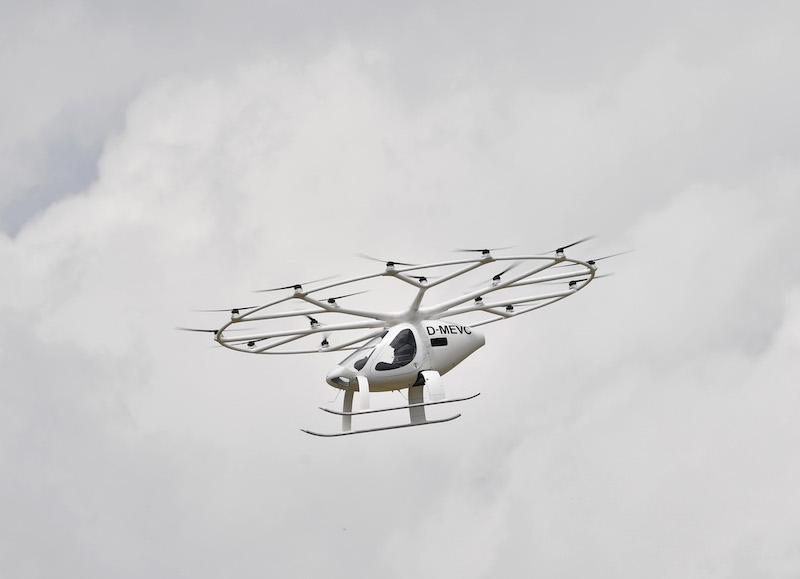
A VoloCity aircraft flies at the Paris Air Show on June 20.
LE BOURGET—Volocopter CEO Dirk Hoke has revealed new details about a next-generation VoloCity air taxi that he predicts could be type certified by 2026.
The next-generation aircraft—which has not been previously reported—would build on the VoloCity’s limited one-passenger capacity and 35-km (22-mi.) range through improvements in battery technology.
Speaking to journalists during a press briefing here at the Paris Air Show on June 20, Hoke said he believes Volocopter can likely achieve battery energy density of around 400 Wh/kg by 2025—compared to between 250 and 300 Wh/kg currently—enabling type certification of the new vehicle by late 2026.
The next-generation VoloCity is separate from the VoloRegion regional air mobility platform currently under development by the company.
“Advances in batteries will enable a larger vehicle with higher payload and longer distances,” Hoke said. “We will not reveal all details yet, but we believe it will at least be a four-seater, and it will be available by the last quarter of 2026.”
Details about the next-generation electric-vertical-takeoff-and-landing (eVTOL) aircraft were shared during a conference held to discuss the company’s plans to launch commercial service in Paris around the time of the 2024 Summer Olympics in the French capital. The network there will initially consist of five vertiports connected by two main lines.
The first main line will connect vertiports at Paris Charles De Gaulle Airport with Paris-Le Bourget Airport. The second line will connect the Paris-Issy-les-Moulineaux heliport in downtown Paris with the Saint-Cyr Suburban vertiport—located near Versaille Palace—and a third vertiport located on the Austerlitz Bridge over the Seine River.
The vertiport network is intended to be fully commercialized by the end of the decade—and to continue as a permanent network operated by Volocopter into the future.
Hoke expressed confidence that Volocopter is on track to achieve type certification for its two-seater Volocity air taxi and all other approvals needed to operate commercially by 2024. But should that timeline slip, he said there are backup plans available to still operate in some capacity during the Olympics.
“Of course, it’s possible to apply for a special permit as a backup measure,” Hoke said. “But right now, we are not planning for that. That said, we’re confident. There is absolutely no fear that we will not certify by 2024. Can it be that we miss that timeline? Yes, we are humans so mistakes are possible, and it’s a very challenging timeline. But we are absolutely convinced that we can make it.”
